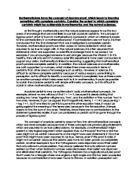TOK Essay. The entire accuracies of mathematics and the natural sciences rely on the four ways of knowing.
Ousainou Corr
TOK 1
Exercise 4
The Areas of Knowledge
May 18th, 2012
Our understanding of the natural sciences is lengthened through descriptions and explanations. The natural sciences consist of biology, chemistry, and physics. We need to describe and demonstrate these sciences in order to be able to understand them. Yet, they also can serve as explanations themselves for other topics. Yet, we still need to be cautious about the claims that are made in the natural sciences as they usually are not the complete truth. For example, when the atom was first observed, the information was not complete and partly incorrect compared to what we have today. But, maybe in the far future, our beliefs about the atom today would be countered with the rapid advance of technology. So, just like other areas of knowledge, the natural sciences also have their weaknesses and limitations. But they can serve as explanations for other topics. In comparison, mathematics is another area of knowledge that can be described and explained meaningfully in order to explain other areas of knowledge. Yet, the natural sciences and mathematics differ in their methods of explanations and how they are described.
The entire accuracies of mathematics and the natural sciences rely on the four ways of knowing. Actually, the natural sciences rely on all four i.e. language, perception, reasoning, and emotion, whilst mathematics only requires three of the four i.e. language, perception, and reasoning. In the natural sciences, language is an important aspect of it. In order for two scientists to be able to converse, they must have equal understanding on a topic. They must understand the terms used. For example, a biologist cannot talk to a chemist about enzymes. A biologist will be talking about how enzymes, such pepsin in your saliva, help with digestion to speed it up. Yet, a chemist will talk about how enzymes speed up chemical reactions. Ideally, they will be talking about the same things, but their terminology will be different and cause miscommunications and there might be lack of understanding between the scientists. So language is a necessity in the natural sciences. For perception, the natural sciences require you to use your senses almost always. In chemistry, biology, and physics, you need your eyes to observe your experiments. You may also need to touch, for example in chemistry, to see if a reaction is endothermic or exothermic. Tasting is the one thing that is not required in any of these sciences, as lab equipment and substances used in the lab are not safe to be out in one’s mouth. They are highly dangerous and can lead to complications and even death. Smell is also another sense that is used. You can smell when something is burning or when a reaction is occurring. Sometimes, reactions let out odors to let you know when they are occurring. Reasoning is necessary as you need be able to, with the background knowledge you have, be able to draw conclusion from reactions. For example, if you see that a reaction released heat, you should be able to reason and draw the conclusion that it is an exothermic reaction. Emotion is another way of knowing that is used in the natural sciences. When writing a hypothesis or prediction, it is your own decision, based on how you feel about the experiment, to guess on a result. Your feelings are also your emotions, and each person’s opinion or feeling about an experiment is different from anybody else’s. In mathematics, only three of the four ways of knowing are required i.e. language, perception, and reasoning. Language is needed as two mathematicians should be able to converse about an equation or question without having to explain everything due to confusions. The ‘math language’ should be common between the two conversation holders. Perception is important as you need to understand how an answer is reached and also understand how to solve and use certain equations or formulae. Reasoning is important as you need to be able to look at a question and the answer and see if the answer is reasonable. You need to be able to reason and see the possibilities and incorrect answers. This is how these two areas of knowledge may be established with the ways of knowing.








